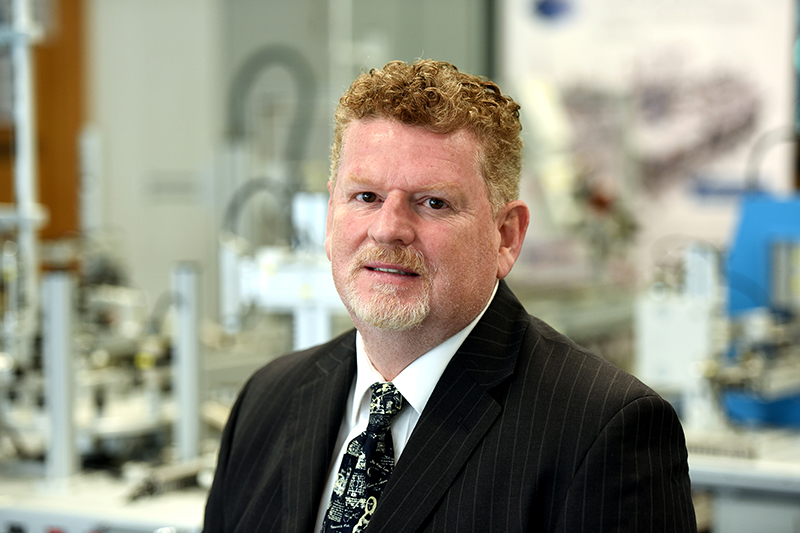Alliance Universities are anchor institutions as well as innovators – benefitting regional economies through vital collaborative research. For instance, since opening in July 2023, Teesside University’s Net Zero Industry Innovation Centre (NZIIC) is playing a key role in the decarbonisation efforts of the Tees Valley and beyond.
In the latest instalment of the ‘Innovators Blog’, The NZIIC’s Director Dr Gari Harris explains how the centre is helping deliver on the Tees Valley’s net zero ambitions through collaboration and impactful research.
“As the Tees Valley economy embraces the green industrial revolution and looks to a future beyond its carbon intensive petrochemical and steelmaking industries, the NZIIC sits at the nexus between those past and future industries.
The just transition to a net zero economy is at the heart of Teesside University’s mission, and the NZIIC is key to this.
We work to help existing businesses to reduce their carbon emissions, while at the same time supporting research into innovative new technologies which can be scaled up into new businesses.
A green legacy
We have rapidly established ourselves as an integral part of the region’s net zero economy and have been credited in a recent independent report with creating a ‘green legacy’ for the region by delivering vital support to regional businesses and helping to create employment and innovation opportunities.
Our work as a national centre of excellence for net zero technologies is also attracting international attention, including from South Africa. We are working on several collaborative projects with South African universities and have twice hosted the South African Minister for Science and Higher Education.
Key to the NZIIC’s success has been our commitment to collaboration with industry, building on Teesside University’s established reputation as an anchor institution driving economic growth.
We work closely with partners in the private and public sectors to identify industry needs and develop solutions for them.
Our recent collaboration with TWI (The Welding Institute), a neighbour at TeesAMP (Teesside Advance Manufacturing Park), has seen the construction of a new engineering hall which will serve as a catalyst for industrial decarbonisation efforts in the Tees Valley.
In this shared facility, joint research bids will be assembled and, upon success, executed within the engineering hall.
Anticipated as a catalyst for technology readiness levels (TRL) four to six – research excellence and breakthroughs – the engineering hall stands poised to drive impactful advancements in the green reindustrialisation of the Tees Valley.
Likewise, our groundbreaking research into how to reduce the carbon footprint from waste-to-energy (WtE) plants by using carbon capture and storage (CCS) technology will have a huge impact on decarbonisation efforts in the region.
The East Coast Cluster aims to remove nearly 50% of the UK’s industrial emissions. To achieve this, there is a need for innovative solutions like CCS retrofits to WtE plants.
The WtE sector is projected to contribute up to an estimated 20m tonnes of CO2 per annum in the UK and requires low-carbon alternatives to mitigate its environmental impact.
Hydrogen economy
For the past two decades, Teesside University has been at the forefront of the regional effort to establish a hydrogen economy and this expertise is driving forward an ambitious £11m project to support hydrogen innovation in the Tees Valley.
Together with Durham University, Teesside has embarked upon the four-year project which has received funding from the Research England Development (RED) Fund, part of UK Research and Innovation.
The Tees Valley is responsible for almost 50% of the UK’s production of hydrogen and innovation in this sector is predicted to be a huge driver of economic growth in the region. A report by KPMG estimates that exploiting the opportunities of the hydrogen economy could add up to £7 billion to the Tees Valley economy by 2050 and create up to 1,000 high-value-added jobs.
The NZIIC is already collaborating on an innovative hydrogen transport demonstration project in the Tees Valley, which will see fleets of zero-emission trucks, powered by hydrogen fuel cells, being deployed across the region from the mid-2020s.

Academics from Teesside University’s School of Computing, Engineering & Digital Technologies and the NZIIC will provide data monitoring and performance evaluation of the project.
Bold ambition
As a national centre of excellence for net zero technology and innovation, the NZIIC has an unashamedly bold ambition to be a key player in the decarbonisation of what has traditionally been one of the most carbon-intensive regions of the United Kingdom.
However, we believe the Tees Valley’s industrial heritage will be key to the success of this mission.
There is a will both from policy makers and from industry to see it achieved and to take advantages of the opportunities offered by net zero.
The East Coast Cluster is developing first-in-pipe technology around carbon capture and storage and green/blue hydrogen production and we have the largest hydrogen storage capabilities in the country.
As well as the moral imperative to cut carbon, there’s a real economic advantage with some major opportunities to be had.
People here are aware of that, and we are here to support them.
Find out more at: www.tees.ac.uk/netzero




